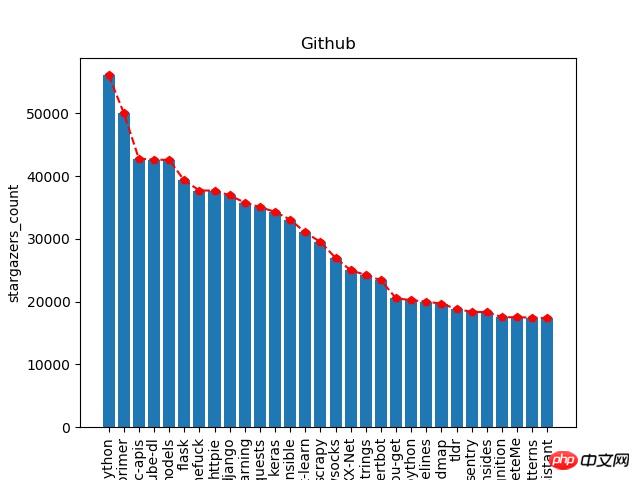Heim >Backend-Entwicklung >Python-Tutorial >Anwendungsfälle des Matplotlib-Moduls in Python (Code)
Anwendungsfälle des Matplotlib-Moduls in Python (Code)
- 不言nach vorne
- 2018-10-12 15:18:502852Durchsuche
Dieser Artikel stellt Ihnen die Anwendungsfälle (Code) des Matplotlib-Moduls in Python vor. Ich hoffe, dass er für Freunde hilfreich ist.
import matplotlib.pyplot as plt import numpy as np import requests url='https://api.github.com/search/repositories?q=language:python&sort=stars' r=requests.get(url) print('数据访问状态值:',r.status_code) print('成功,正常获取网站数据'if r.status_code==200 else '错误,无法获取数据') response_dict=r.json() #转换成字典 #print(response_dict) repo_dicts=response_dict['items'] #print(repo_dicts) names=[repo_dict['name']for repo_dict in repo_dicts] print(names) plot_dicts=[repo_dict['stargazers_count'] for repo_dict in repo_dicts] print(plot_dicts) x=np.arange(len(names)) #x轴 plt.bar(x,plot_dicts) #y轴 plt.plot(x,plot_dicts,'rp--') #折线图 ax=plt.subplot() ax.set_ylabel('stargazers_count') #y轴标题 ax.set_xlabel('Github Reponstorys') #x轴标题 ax.set_xticks(x) #设置每一个x的标题 ax.set_xticklabels(names,rotation=90) #给每一个柱子加上标题 ax.set_title('Github') #plt.grid(linestyle='--') #虚线为背景,一个’-‘为实线,俩个为虚线 #plt.show() #保存图片 import os imgPath = os.getcwd() + '/images/ch04_demo05_github.jpg' plt.savefig(imgPath) print('图片保存成功.')
Das Ergebnis ist:

Das ist eigentlich relativ einfach, nehmen Sie einfach die JSON-Daten heraus und visualisieren Sie sie mit Matplotlib.
Das Obige ist der gesamte Inhalt dieses Artikels. Weitere spannende Inhalte zu Python finden Sie auf der chinesischen PHP-Website Python-Video-Tutorial und Python-Artikel-Tutorial! ! !
Das obige ist der detaillierte Inhalt vonAnwendungsfälle des Matplotlib-Moduls in Python (Code). Für weitere Informationen folgen Sie bitte anderen verwandten Artikeln auf der PHP chinesischen Website!

